in Thoreau’s Journal

We too have our thaws. They come to our January moods….

in Thoreau’s Journal

We too have our thaws. They come to our January moods….
in Thoreau’s Journal:
You glance up these paths, closely imbowered by bent trees, as through the side aisles of as cathedral, and expect to hear a quire chanting from their depths. You are never so far in them as they are far before you. Their secret is where you are not, and where your feet can never carry you.
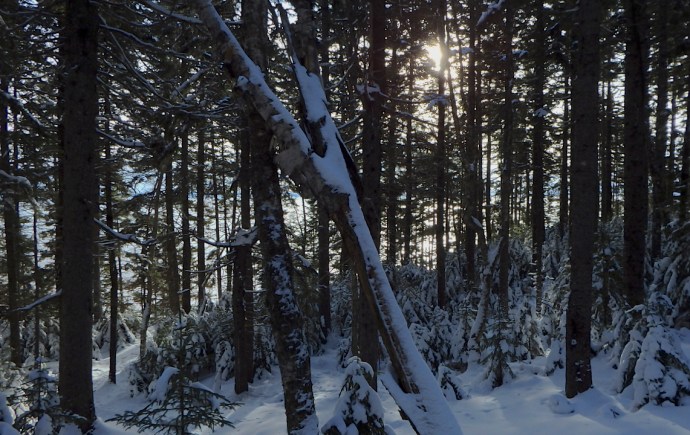
I tread in the tracks of the fox which has gone before me by some hours, or which perhaps I have started, with such a tiptoe of expectation, as if I were on the trail of the spirit itself which resides in these woods, and expected soon to catch it in its lair.
The snow falls on no two trees alike, but the forms it assumes are as various as those of the twigs and leaves which receive it.
Here is the distinct trail of a fox stretching quarter of a mile across the pond. Now I am curious to know what has determined its graceful curvatures, its greater or less spaces and distinctness, and how surely they were coincident with the fluctuations of some mind….
The pond was his journal, and last nights snow made a tabla rasa for him. I know which way a mind wended this morning. —what horizon it faced by the setting of these tracks—whether it moved slowly or rapidly….
in Thoreau’s Journal:
Men lie behind the barrier of a relation as effectually concealed as the landscape by a mist; and when at length some unforeseen accident throws me into a new attitude toward them, I am astounded as if for the first time I saw the sun on the hillside.
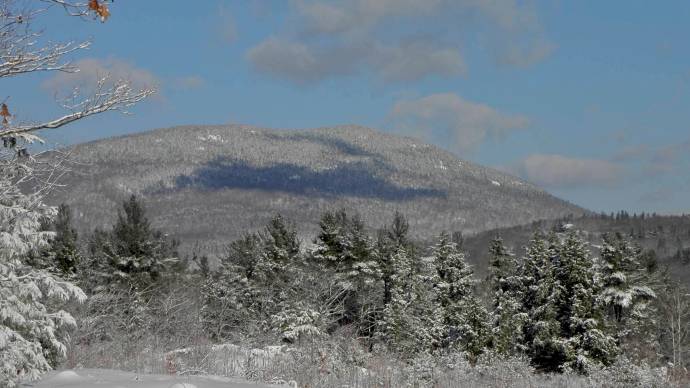
Of all strange and unaccountable things this journalizing is the strangest. It will allow nothing to be predicted of it.
in Thoreau’s Journal

Perhaps I can never find so good a setting for my thoughts as I shall thus have taken them out of.
in Thoreau’s Journal:
To Hill and beyond. It is so mild and moist as I saunter along by the wall and east of the hill that I remember or anticipate one of those warm rain storms in the spring when the earth is just laid bare, the wind is south, and the Cladonia lichens are swollen and lusty with moisture, your foot sinking into them, and pressing the water out as from a sponge, and the sandy places also are drinking it in. You wander indefinitely in a beaded coat, wet to the skin of your legs, sit on moss-clad rocks and stumps, and hear the lisping of migrating sparrows flitting amid the shrub oaks, sit long at a time, still, and have your thoughts. A rain which is as serene as fair weather, suggesting fairer weather than was ever seen. You could hug the clods that defile you. You feel the fertilizing influence of the rain in your mind. The part of you that is wettest is fullest of life, like the lichens.

You discover evidences of immortality not known to divines. You cease to die. You detect some buds and sprouts of life. Every step in the old rye field is on virgin soil. ––– And then the rain comes thicker and faster than before, thawing the remaining part of the ground, detaining the migrating bird, and you turn your back to it, full of serene, contented thoughts, soothed by the steady dropping on the withered leaves, more at home for being abroad, sinking at each step deep into the thawing earth, gladly breaking through the gray rotting ice. The dullest sounds seem sweetly modulated by the air. You leave your tracks in fields of spring rye, scaring the fox-colored sparrows along the woodsheds,…full of joy and expectation, seeing nothing but beauty, hearing nothing but music, as free as the fox-colored sparrow,….not indebted to any academy or college for this expansion, but chiefly to the April sun which shineth on all alike, not encouraged by men in your walks, not by the divines or the professors, and to the lawgiver an outlaw….Steadily the eternal rain falls, drip, drip, drip, the mist drives and clears your sight, the wind blows and warms your sitting on that sandy upland that April day.
in Thoreau’s Journal
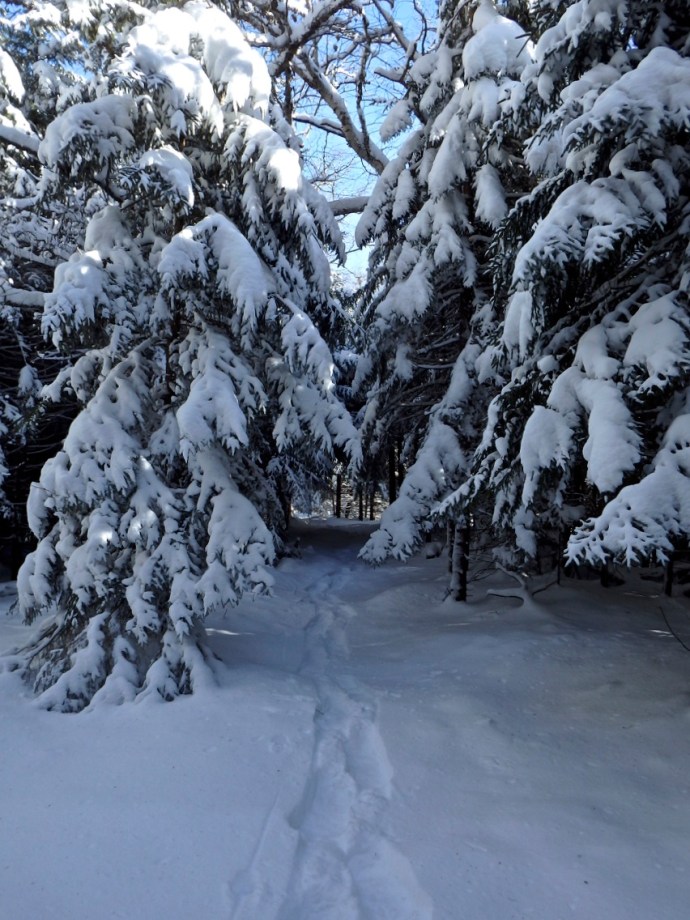
Let us preserve religiously, secure, protect the coincidence of our life with the life of nature.
Excerpt of a letter from Vincent van Gogh to Theo van Gogh
Arles, 24 September 1888
If we study Japanese art, we discover a man who is undeniably wise, philosophical and intelligent, who spends his time – doing what? Studying the distance from the earth and the moon? No! Studying the politics of Bismarck? No! He studies … a single blade of grass. But this blade of grass leads him to draw all the plants – then the seasons, the grand spectacle of landscapes, finally animals, then the human figure. That is how he spends his life, and life is too short to do everything.

So come, isn’t what we are taught by these simple Japanese, who live in nature as if they themselves were flowers, almost a true religion?
in Thoreau’s Journal:
It is glorious to be abroad this afternoon, the snow melts on the surface; the warmth of the sun reminds me of summer….Ah then, the brook beyond, its rippling waters and its sunny sands. They made me forget it was winter….
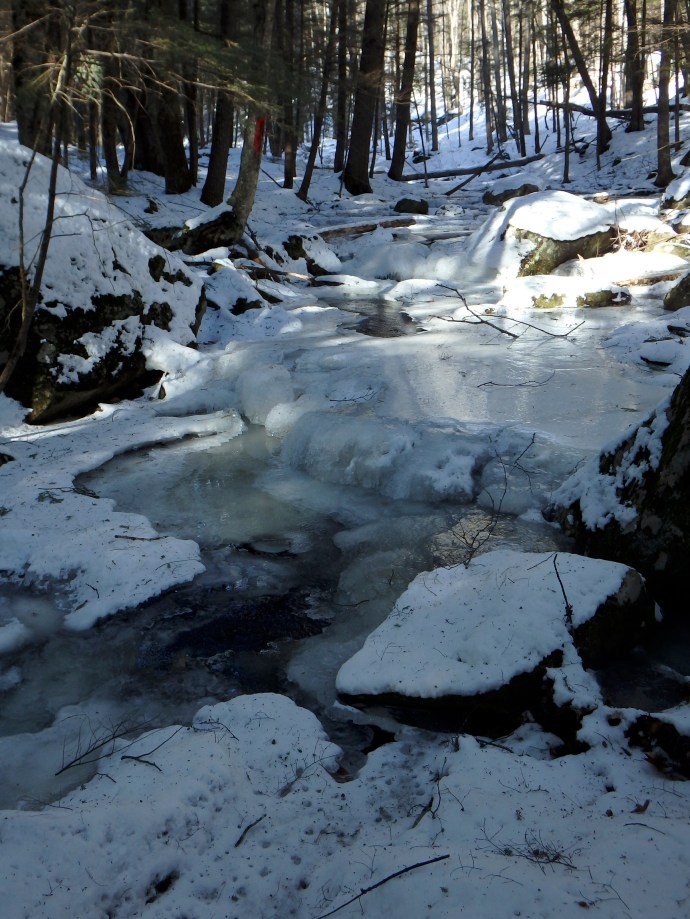
The sun reflected from the sandy, gravelly bottom, sometimes a bright sunny streak no bigger than your finger reflected from a ripple as from a prism, and the sunlight reflected from a hundred points of the surface of the rippling brook, enabled me to realize summer…
in Thoreau’s journal:
A journal is a record of experiences and growth, not a preserve of things well done or said….The charm of the journal must consist in a certain greenness, though freshness, and not in maturity. Here I cannot afford to be remembering what I said or did…

….I do not the least care where I get my ideas, or what suggests them…
in Thoreau’s Journal:
To insure health, a man’s relation to nature must come very near to a personal one….I do not see that I can live tolerably without affection for nature. If I feel no softening toward the rocks, what do they signify…

in Thoreau’s Journal

No second snow-storm in the winter can be so fair and interesting as the first.
in Thoreau’s Journal:
…..I am disturbed by the sound of my steps on the frozen ground. I wish to hear the silence of the night. I cannot walk with my ears covered, for the silence is something positive and to be heard….

When I enter the woods, I am fed by the variety, the forms of the trees above against the blue, with the stars seen through the pines, like the lamps hung on them in an illumination, the somewhat indistinct and misty fineness of the pine tops, the finely divided spray of the oaks, etc., and the shadow of all these on the snow.
in Thoreau’s Journal:
In certain places, standing on their snowiest side, the woods were incredibly fair, white as alabaster. Indeed, the young pines reminded you of the purest statuary, and the stately, full-grown ones, towering around, affected you as if you stood in a Titanic sculptor’s studio, so purely and delicately white, transmitting the light, their dark trunks all concealed; and in many places where the snow lay on withered oak leaves between you and the light, various delicate, fawn-colored tints blending with the white enhanced their beauty….

I doubt if I can convey an idea of the appearance of the woods yesterday. As you stood in their midst, and looked round on their boughs and twigs laden with snow, it seemed as if there could be none left to reach the ground. These countless zigzag white arms crossing each other at every possible angle completely closed up the view like a light drift within three or four rods on every side, the wintriest prospect imaginable. That snow which sifted down into the wood was much drier and lighter than elsewhere.
in Thoreau’s Journal:
I anticipate a more thorough sympathy with nature when my thigh bones shall strew the ground like the boughs which the wind has scattered. These troublesome humours will flower into early anemones, and perhaps in the very lachrymal sinus, nourished by its juices, some young pine or oak will strike root.
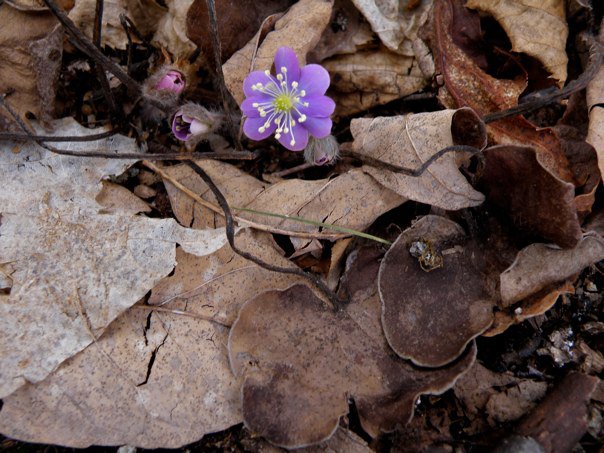
http://www.nytimes.com/2016/01/24/magazine/the-living-dead.html?
January 18, 1841
We must expect no income beside our outgoes. We must succeed now, and we shall not fail hereafter. So soon as we begin to count the cost, the cost begins.

January 18, 1856
Many times I thought that if the particular tree, commonly an elm, under which I was walking or riding were the only one like it in the county, it would be worth a journey across the continent to see it. Indeed, I have no doubt that such journeys would be undertaken on hearing a true account of it. But instead of being confined to a single tree, this wonder was as cheap and common as the air itself. Every man’s wood-lot was a miracle and surprise to him and for those who could not go far there were the trees in the street….
in Thoreau’s Journal:
In proportion as I have celestial thoughts is the necessity for me to be out and behold the western sky before sunset these winter days.

That is the symbol of the unclouded mind that knows neither winter nor summer. What is your thought like? That is the hue, that the purity and transparency and distance from earthly taint of my inmost mind; for whatever we see without is a symbol of something within, and that which is farthest off is the symbol of what is deepest within. The lover of contemplation, accordingly, will gaze much into the sky. Fair thoughts and a serene mind make fair days.
in Thoreau’s Journal:
….As we go southwestward through the Cassandra hollows toward the declining sun, they look successively, both by their form and color, like burnished silver shields in the midst of which we walked, looking toward the sun.

in Thoreau’s Journal:

There is a still life in America that is little observed or dreamed of.
in Thoreau’s Journal:

….It is a mild day, and I notice, what I have not observed for some time, that blueness of the air only to be perceived in a mild day. I see it between me and the woods half a mile distant. The softening of the air amounts to this. The mountains are quite invisible. You come forth to see this great blue presence lurking about the woods and the horizon.
in Thoreau’s Journal:
Here I am on the Cliffs at half-past three or four o’clock. The snow more than a foot deep over all the land.
 Few, if any, leave the beaten paths.
Few, if any, leave the beaten paths.
in Thoreau’s Journal:
It is a very beautiful and spotless snow, it having just cased falling. You are struck by its peculiar tracklessness, as if it were a thick white blanket just spread…

This was a star snow, dry, but the stars of considerable size. It lies up light as down. When I look closely, it seems to be chiefly composed of crystals in which the six rays or leaflets are more or less perfect, with a cottony powder intermixed. It is not yet in the least melted by the sun. The sun is out very bright and pretty warm and going from it, I see a myriad sparkling points scattered over the surface of the snow….
You must be logged in to post a comment.